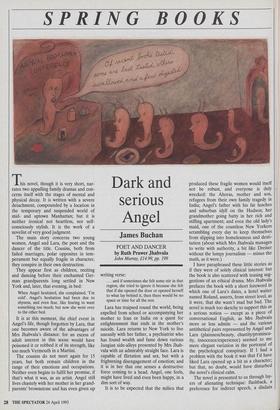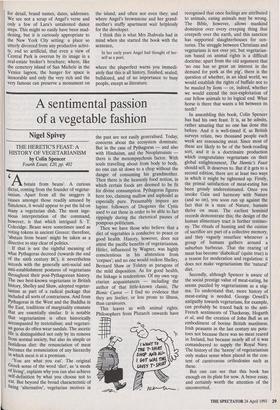SPRING BOOKS
Dark and serious Angel
James Buchan
POET AND DANCER by Ruth Prawer Jhabvala John Murray, f14.99, pp. 199 This novel, though it is very short, nar- rates two appalling family dramas and con- cerns itself with the stages of mental and physical decay. It is written with a severe detachment, compounded by a location in the temporary and suspended world of mid- and uptown Manhattan; but it is neither ironical not heartless, nor self- consciously stylish. It is the work of a novelist of very good judgment.
The main story concerns two young women, Angel and Lara, the poet and the dancer of the title. Cousins, both from failed marriages, polar opposites in tem- perament but equally fragile in character, they conspire in their own destruction.
They appear first as children, reciting and dancing before their enchanted Ger- man grandparents long settled in New York and, later, that evening, in bed:
When Angel hesitated, she complained, 'I'm cold'. Angel's hesitation had been due to shyness, and even fear, like fearing to want something too much; but now she went over to the other bed.
It is at this moment, the chief event in Angel's life, though forgotten by Lara, that one becomes aware of the advantages of Mrs Jhabvala's distance: for an excess of adult interest in this scene would have poisoned it or robbed it of its strength, like too much Vermouth in a Martini.
The cousins do not meet again for 15 years, but both remain children in the range of their emotions and occupations. Neither even begins to fulfil her promise, if that's what it was, as an artist. Angel still lives chastely with her mother in her grand- parents' brownstone and has even given up writing verse: ... and if sometimes she felt some stir in that region, she tried to ignore it because she felt that if she opened the door or opened herself to what lay behind it, then there would be no space or time for all the rest.
Lara has traipsed round the world, being expelled from school or accompanying her mother to Iran or India on a quest for enlightenment that ends in the mother's suicide. Lara returns to New York to live uneasily with her father, a psychiatrist who has found wealth and fame down various Jungian side-alleys presented by Mrs Jhab- vala with an admirably straight face. Lara is capable of flirtation and sex, but with a frightening disengagement of emotion; and it is in her that one senses a destructive force coming to a head. Angel, one feels, might have lived and even been happy, in a dim sort of way.
It is to be expected that the milieu that produced these fragile women would itself not be robust, and everyone is duly wrecked: the Ahoras, mother and son, refugees from their own family tragedy in India; Angel's father with his fat lunches and suburban idyll on the Hudson; her grandmother going batty in her rich and stifling apartment; and even the old lady's maid, one of the countless New Yorkers scrambling every day to keep themselves from slipping into homelessness and desti- tution (about which Mrs Jhabvala manages to write with authority, a bit like Dreiser without the lumpy journalism — minus the math, as it were.) I have paraphrased these little stories as if they were of solely clinical interest: but the book is also scattered with teasing sug- gestions of an ethical drama. Mrs Jhabvala prefaces the book with a short foreword in which one of Lara's dates, a hotel waiter named Roland, asserts, from street level, as it were, that she wasn't mad but bad. The novel is much too sketchy to support this as a serious notion — except as a piece of conversational English, as Mrs Jhabvala more or less admits — and the various antithetical pairs represented by Angel and Lara (plainness/beauty, chastity/promiscu- ity, innocence/experience) seemed to me mere elegant variation in the portrayal of the psychological conspiracy. If I had a problem with the book it was that I'd have liked Lara opened up a bit as a character; but that, no doubt, would have disturbed the novel's clinical calm.
The novel is presented to us through lay- ers of alienating technique: flashback, a preference for indirect speech, a disdain for detail, brand names, dates, addresses. We see not a scrap of Angel's verse and only a few of Lara's untalented dance steps. This might so easily have been mad- dening, but it is curiously appropriate to the New York City setting: a place so utterly divorced from any productive activi- ty, and so artificial, that even a view of Central Park is overrun by its image in a real-estate broker's brochure; where, like the cemetery island of San Michele in the Venice lagoon, the hunger• for space is inexorable and only the very rich and the very famous can preserve a monument on the island, and often not even they; and where Angel's brownstone and her grand- mother's stuffy apartment wait helplessly for the developer.
I think this is what Mrs Jhabvala had in mind when she started the book with the sentence, In her early years Angel had thought of her- self as a poet, where the pluperfect warns you immedi- ately that this is all history, finished, sealed, bulldozed, and of no importance to busy people, except as literature.



























































 Previous page
Previous page